Related Research Articles
"Country Sunshine" is a song co-written and recorded by American country music artist Dottie West, remembered both as one of West's biggest chart hits, and also as the jingle from a classic Coca-Cola television ad: co-written by West with Billy Davis and Dianne Whiles, "Country Sunshine" was released September 1973 as the first single from West's Country Sunshine album.
"A Lesson in Leavin'", also titled as "Lesson in Leavin"', is a song written by Randy Goodrum and Brent Maher. It was originally recorded in 1979 by American country music singer, Dottie West, for her Special Delivery album.

"What Are We Doin' in Love" is a song written by Randy Goodrum and recorded by American country music artist Dottie West. Although not credited on the single release, the song also features American country and pop recording artist Kenny Rogers. It was released in March 1981 as the second single from the album Wild West. The song was West and Rogers' third and final number one on the country chart.
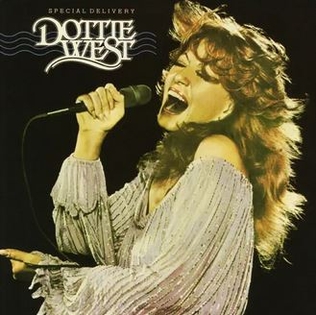
Special Delivery is the twenty-second solo studio album by American country artist, Dottie West. The album was released in 1979 on Liberty Records and was produced by Randy Goodrum and Brent Maher. The album came on the heels of two chart-topping West duet albums with Kenny Rogers and reestablished West as a major solo artist, becoming West's most successful solo album since 1967, thanks in part to three top 15 country hits on the collection, including "A Lesson in Leavin'", the first solo number one record in West's 20-year career.

With All My Heart and Soul is a studio album by American country music artist Dottie West. It was released in January 1967 on RCA Victor Records and was produced by Chet Atkins. It was West's fourth studio album as a recording artist after having her first major hit in 1964. The album included 12 tracks, including the single "Paper Mansions". The song became a top ten hit on the Billboard country chart following its release. The album itself would also chart on a similar Billboard country albums survey.

Country Sunshine is a studio album by American country music artist Dottie West. It was released in November 1973 on RCA Victor Records. The album's ten tracks were produced by Billy Davis. Her 21st studio recording, Country Sunshine was released following the success of the title track. The song became a major hit after first being part of a Coca-Cola commercial. The album itself would reach major positions on national publication charts following its release.
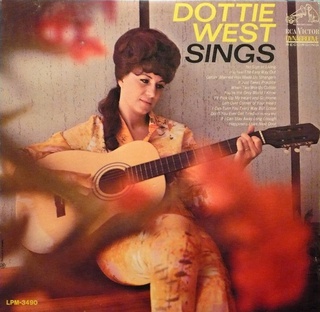
Dottie West Sings is a studio album by American country music artist Dottie West. It was released in December 1965 on RCA Victor Records and was produced by Chet Atkins. The album was West's second studio album to be released as a recording artist. The record included several songs composed by West and other writers. It also included two singles that became top 40 hits on the Billboard country chart in 1965.
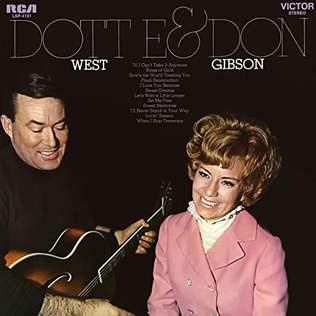
Dottie and Don is a studio album by American country music artists Don Gibson and Dottie West. It was released in March 1969 on RCA Victor Records and was produced by Chet Atkins and Danny Davis. The album was a collection of duet recordings between Gibson and West. It was both artists first album of duets to be recorded. Among the songs from the project, "Rings of Gold" became a major hit in 1969.
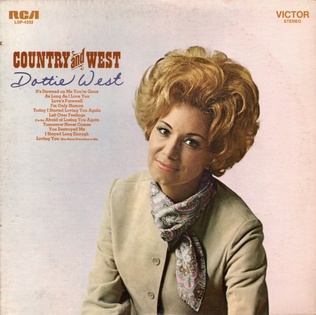
Country and West is a studio album by American country music artist Dottie West. It was released in May 1970 on RCA Victor Records and was produced by Danny Davis. Her fourteenth studio album, Country and West spawned one single that became a minor hit on the national publication charts in 1970. It was also one of three studio albums West would release in 1970.

I'm Only a Woman is a studio album by American country music artist Dottie West. It was released in May 1972 on RCA Victor Records and was produced by Jerry Bradley. The project was West's nineteenth studio album. Among the album's ten tracks were two charting singles issued between 1971 and 1972. It was West's only studio release issued in 1972 and third studio album not receive a Billboard chart placement.
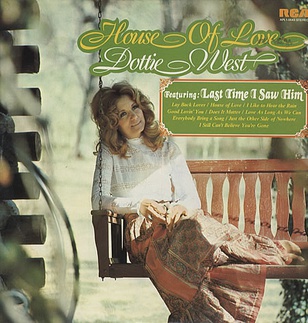
House of Love is a studio album by American country music artist Dottie West. It was released in May 1974 on RCA Victor Records and was produced by Billy Davis. It was West's 22nd studio recording in her music career and contained ten tracks. Among its singles was the song "Last Time I Saw", which became a top ten hit in 1974.
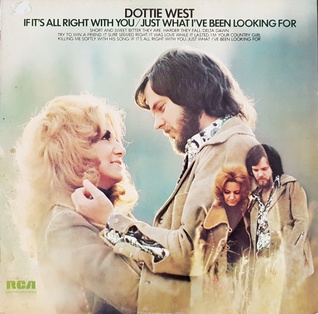
If It's All Right with You/Just What I've Been Looking For is a studio album by American country music artist Dottie West. It was released in May 1973 on RCA Victor Records and was produced by Jerry Bradley. The project was West's 20th studio recording in her music career. It consisted of ten tracks, two of which became minor hits on the country charts in 1973. The album's contemporary sound helped modernize West's music, bringing the album to chart on the Billboard country albums survey in 1973.

The singles discography of American country artist Dottie West contains 59 singles released as a solo artist, 12 singles released as a collaborative artist, 3 promotional singles and 1 other charting song. West signed with RCA Victor Records in 1963, having her first Top 40 hit the same year. It was followed in 1964 by "Love Is No Excuse", a duet with Jim Reeves that became West's first top 10 hit. In 1964, she also released "Here Comes My Baby". The song reached number 10 on the Billboard Hot Country Singles chart and became the first song by a female country artist to win a Grammy award. From her 1966 album, West issued four singles, including the top 10 hits "Would You Hold It Against Me" and "What's Come Over My Baby". Over the next two years she had major hits with "Paper Mansions", "Like a Fool", "Country Girl", and "Reno". In 1969, West collaborated with Don Gibson on "Rings of Gold", which reached number 2 on the Billboard country chart. In 1973, she released a single version of a commercial jingle originally used by The Coca-Cola Company. Entitled "Country Sunshine", the song became West's biggest hit, reaching number 2 on the country songs chart and number 49 on the Billboard Hot 100. The song also nominated her for her eleventh Grammy. After releasing the top 10 hit "Last Time I Saw Him" (1974), West's chart hits declined and she was dropped from RCA in 1976.
"Country Girl" is a song co-written and recorded by the American country music artist Dottie West. It was released in March 1968 as the first single and title track from the album Country Girl. The song peaked at number 15 on the Billboard Hot Country Singles chart. In addition, "Country Girl" was West's first song to enter the Canadian RPM Country chart, reaching a peak of number 5. West wrote the song with Red Lane.
"Reno" is a song written by Ruby Allmond, and recorded by American country music artist Dottie West. It was released August 1968 as the first single from the album The Best of Dottie West. The song peaked at number 19 on the Billboard Hot Country Singles chart. In addition, "Reno" peaked at number 6 on the Canadian RPM Country chart.
"Come See Me and Come Lonely" is a song written by Red Lane, and recorded by American country music artist Dottie West. It was released in May 1978 as the first single from the album Dottie. The song peaked at number 17 on the Billboard Hot Country Singles chart. In addition, "Come See Me and Come Lonely" peaked at number 28 on the Canadian RPM Country chart. Later in the year, the single was released onto West's 1978 album entitled Dottie. It was the only single released from the album.
"Anyone Who Isn't Me Tonight" is a song written by Julie Didier and Casey Kelly, and recorded by American country music artists Kenny Rogers and Dottie West. It was released in August 1978 as the second single from the album Every Time Two Fools Collide. The song peaked at number 2 on the Billboard Hot Country Singles chart. The song also peaked at number 10 on the RPM Country Tracks chart that year.

The albums discography of American country artist Dottie West contains 28 studio albums as a solo artist, five studio albums as a collaborative artist, 18 compilation albums and additional album appearance. Among West's studio releases were five collaborative albums with various artists, including Kenny Rogers. After signing with RCA Victor Records in 1963, West released her debut studio album Here Comes My Baby (1965). The album peaked at number 12 on the Billboard Top Country Albums chart in July 1965. West's third studio album Suffer Time (1966) spawned four singles, including "Would You Hold It Against Me", a top 5 hit on the Billboard Hot Country Songs chart. Suffer Time would reach number 3 on the country albums chart, West's highest-charting solo album. Between 1967 and 1968, West released 5 more studio albums. With All My Heart and Soul (1967) featured the top 10 hit "Paper Mansions" and the album itself peaked at number 8 on the Top Country Albums list. In 1969, she paired with Don Gibson for her first collaborative project Dottie and Don. The album featured the pair's number 2 Billboard country hit "Rings of Gold". In 1970, she collaborated with Jimmy Dean on the studio release Country Boy and Country Girl. In 1973, West had her biggest hit with the single "Country Sunshine". Its corresponding album of the same name peaked at number 17 on the country album chart in February 1974.

Country Boy & Country Girl is a studio album by American country music artists Jimmy Dean and Dottie West. It was released in November 1970 on RCA Victor Records and was produced by Jerry Bradley. The project was a collection duet recordings between both artists. It was Dean's first collaborative album and West's second. The album spawned one single entitled "Slowly", which would be released in 1971. Country Boy & Country Girl would also reach peak positions on national music publication charts following its release.

Have You Heard...Dottie West is a studio album by American country music artist Dottie West. It was released in October 1971 on RCA Victor Records and was produced by Jerry Bradley. The album was West's eighteenth studio record released in her career and second record to be released in 1971. The album included ten tracks, two of which became singles. The first single, "Six Weeks Every Summer ", became a minor hit on the country charts.
References
- ↑ Whitburn, Joel (2004). The Billboard Book Of Top 40 Country Hits: 1944-2006, Second edition. Record Research.
- ↑ "Dottie West Chart History (Hot Country Songs)". Billboard.